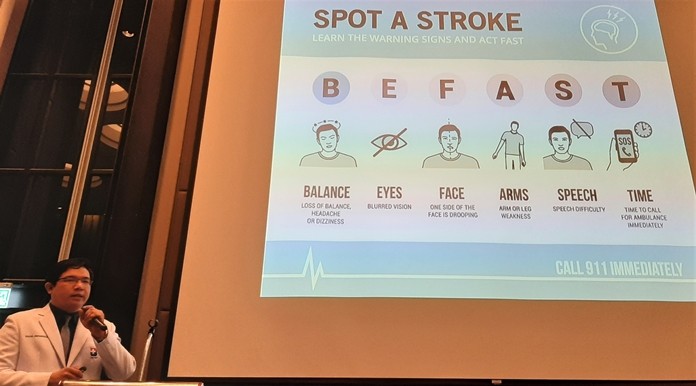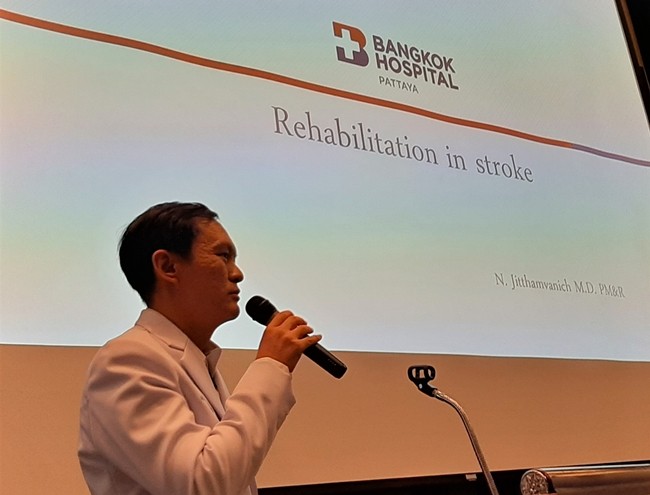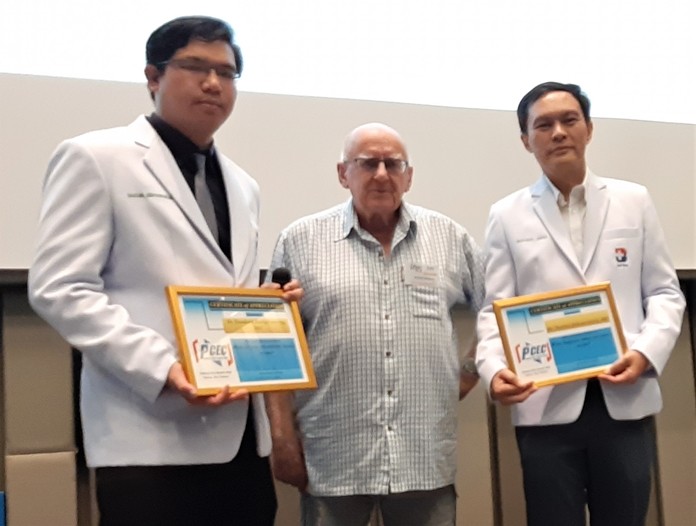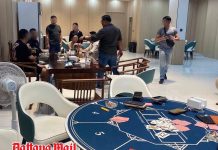
What happens when you have a stroke? How do you rehabilitate from one? These questions were answered by two doctors from Bangkok Hospital Pattaya (BHP) when they spoke to the Pattaya City Expats Club’s Sunday, December 1, meeting.
Dr. Natchai Jitthamvanich, MD, and Dr. Tanakorn Suebphanwong, MD, tag teamed their special presentation on the subject of this serious medical emergency and its aftermath. Dr. Tanakorn is a Neurologist specializing in diagnosis and treatment for strokes. Dr. Natchai, is a Physical Medicine and Rehabilitation Specialist.
Why is knowing about a stroke important? A stroke is a serious medical condition that can result in paralysis or even death depending on its severity and how soon treatment can be started. There are two main types of stroke, one due to lack of blood flow to the brain, and the other due to bleeding in the brain. Both result in parts of the brain not functioning properly. Immediate recognition and treatment is necessary, thus it is important to be able to recognize the signs if someone is having a stroke, especially since so many Expats here are older retirees and, thus, at a higher risk of having one.

Stokes are prevalent as one in four of the world’s population will suffer a stroke in their lifetime and is the second leading cause of death. The US alone had 103 billion dollars in lost revenue as a result of folks having a stroke. Further, a stroke can cause critical life changing limitations.
We often hear of heart attacks which result from a blockage in the blood flow to the heart. A stroke can be considered a “brain attack” where a disruption of blood supply and therefore oxygen to the brain takes place. This can result in the loss of brain cells causing paralysis or death. The risks for stroke include a familiar list of bad actors including high blood pressure, smoking, excessive sodium input as well as family or personal history.
A stroke can be recognized by various symptoms including imbalance, slurred speech, blurred vision, weakness in limbs and a sagging face. Once these warning signs are perceived, it is imperative to get medical attention as soon as possible. Timely treatment is critical in order to preserve both body and brain function. During a stroke 2 million brain cells die every minute.
Since stokes are very preventable, the doctors offered a simple list of 7 stroke prevention activities. These include stop smoking, make an attempt to reduce blood pressure, reduce salt intake, try and lower cholesterol levels and blood sugar, lose weight and initiate physical exercise. In the long run these practices, though life changing in some cases, are better alternatives to a stroke and its aftermath.
They emphasized that time is critical in the treatment of a stroke’s effects. If medical attention is obtained within 4 and a half hours, a chemical called altephase can be injected to the stroke site to dissolve a clot/blockage. If within 6 hours, an operation attempt can be made to remove the clot. Time is critical! The sooner treatment can be done, the less damage the stroke can cause.
Once you have had a stroke, rehabilitation may start as soon as 24 to 48 hours after the attack and may last six months or longer. The severity of the stroke and the damage that was done to the brain will determine what things may have to be relearned by the patient.
The take away from the talk was delineated clearly in three simple terms: Reduce (the risk factors for stroke), Recognize (the signs of a stroke) and Respond (get medical help quickly).
Dr. Tanakorn received his Doctor of Medicine from the Faculty of Medicine at Srinakarinwirot University, Thailand. He did his Internship at Bungkhan Hospital in Bungkhan, Thailand and Residency training in Neurological programs at Siriraj hospital in Bangkok. At BHP, he is a Consultant for the Clinical Care Program Certification of Primary Stroke Center as well as an expert clinical advisor of the Comprehensive Stroke Care Clinic project. He is a member of the Neurological Society of Thailand and of the International Parkinson and Movement Disorder Society.

Dr. Natchai received his Doctor of Medicine from the Faculty of Medicine and Diplomate from the Thai Board of Rehabilitation Medicine at Chulalongkorn Hospital. From August to October 2004, he gained experience in Physical Medicine and Rehabilitation at Ladprao General Hospital, Bangkok, and from 1999 to 2001 he was a General Practice doctor at Thachana Hospital, Surat Thani. He has been at BHP’s Rehabilitation Center since December 2004.
After the doctors answered many questions from the audience, the MC brought everyone up to date on the upcoming club events and others of interest. This was followed by the Open Forum where questions are asked and answered about Expat living in Thailand, especially Pattaya. For more information about the PCEC, visit their website at: http://pattayacityexpatsclub.com/.




